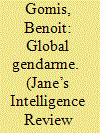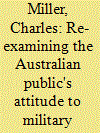| Srl | Item |
| 1 |
ID:
136759


|
|
|
|
|
| Summary/Abstract |
The authors provide an overview of official documents and materials that laid the foundations of the military policy and military doctrine in the people’s republic of China (PCR). They discuss the feasibility of a military and political alliance between China and Russia.
|
|
|
|
|
|
|
|
|
|
|
|
|
|
|
|
| 2 |
ID:
136906


|
|
|
|
|
| Summary/Abstract |
The paper disclose the origin and evolution of the national security concept in US political science, analysing the structure of US national security strategy and its relations relation to military policies and military strategy.
|
|
|
|
|
|
|
|
|
|
|
|
|
|
|
|
| 3 |
ID:
135692


|
|
|
|
|
| Summary/Abstract |
Francois Hollande has proved active on the international stage, intervening militarily and diplomatically on many fronts, Benoit Gomis examines whether persistent internal challenges may force France to become more isolationist in the future.
|
|
|
|
|
|
|
|
|
|
|
|
|
|
|
|
| 4 |
ID:
134247


|
|
|
|
|
| Summary/Abstract |
Australia, like most other developed democracies, is often alleged to suffer from ‘casualty phobia’. The perception that the Australian public will not tolerate casualties in foreign conflicts has shaped the decisions of both civilian and military policy makers. Measures taken to protect Australian forces from casualties may, for instance, also serve to increase the risk to civilians in the country to which they are deployed. The USA underwent a similar debate some years ago. Innovative public opinion research techniques—especially ‘survey experiments’ which allow researchers to establish causal relationships by consciously manipulating one variable while holding others constant—have established that the American public are not reflexively casualty-phobic and that the impact of casualties on public opinion can be outweighed by other factors, such as the public's confidence in the mission's overall success. In this article, the author replicates one of the key survey experiments from the US debate, suitably adapted to Australian conditions, with a nationally representative sample of Australian voters. The author finds that the same pattern holds in Australia as in the USA: casualties do lower public support for a given mission, but the mission's chances of success matter more.
|
|
|
|
|
|
|
|
|
|
|
|
|
|
|
|
| 5 |
ID:
134769


|
|
|
|
|
| Summary/Abstract |
This article aims to explore the problems of democratic governance of the defense and security sectors in Turkey. In recent years, to democratize its civil–military relations, Turkey has successfully dealt with the first-generation problems of making institutional reforms to eliminate the military's intervention in politics. Democratic civil–military relations, however, cannot be achieved only by getting the military out of politics, but also require the elimination of second-generation problems concerning the democratic governance of the defense and security sectors. In this respect, Turkey faces significant challenges related to its ineffective defense policy-making structures, insufficient parliamentary oversight of the defense and security sectors and civil society's very low level of participation in defense and security debates. Turkey needs to make reforms in these problematic areas in order to democratize its civil–military relations.
|
|
|
|
|
|
|
|
|
|
|
|
|
|
|
|
| 6 |
ID:
136363


|
|
|
|
|
| Summary/Abstract |
Event since the Islamic state’s Erbil offensive have exposed the weakness of some Kurdish forces, while rising the profile of their cause. Jonathan Spyer examine Iraqi and Syrian Kurdish groups’ responses and analyses the potential future outcome
|
|
|
|
|
|
|
|
|
|
|
|
|
|
|
|
| 7 |
ID:
134977


|
|
|
|
|
| Summary/Abstract |
Creating institutions that effectively manage interstate conflict is a priority for policy-makers. In this article we demonstrate that military allies are well positioned to influence the crisis-bargaining behavior of both challengers and targets in ways that often lead to peace. Through a three-player game-theoretic model, we demonstrate that a target's alliances not only have an effect on the demand that the challenger makes, but also on the behavior of the target. When a target values an alliance highly, an ally's recommendation for settlement can encourage the target to concede to demands without further escalation. Our statistical analysis provides evidence in support of the theoretical finding. Allies can both deter challengers and restrain partners, and as a result, can encourage peaceful behavior not only from adversaries, but from member states as well. Our study thus sheds new light on the role of military alliances as potential conflict management devices.
|
|
|
|
|
|
|
|
|
|
|
|
|
|
|
|